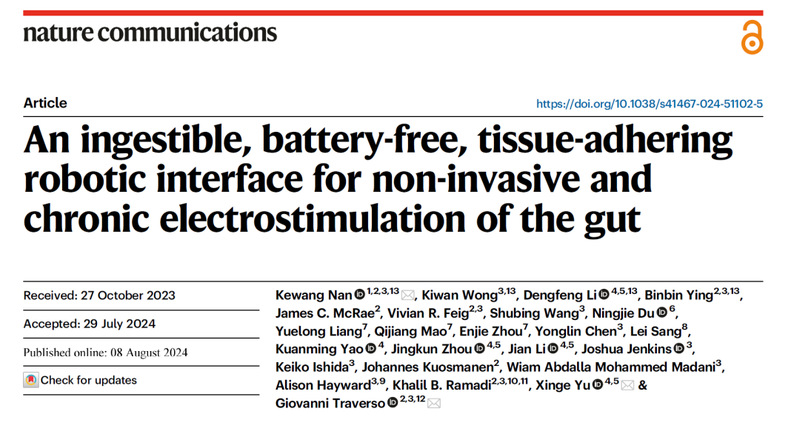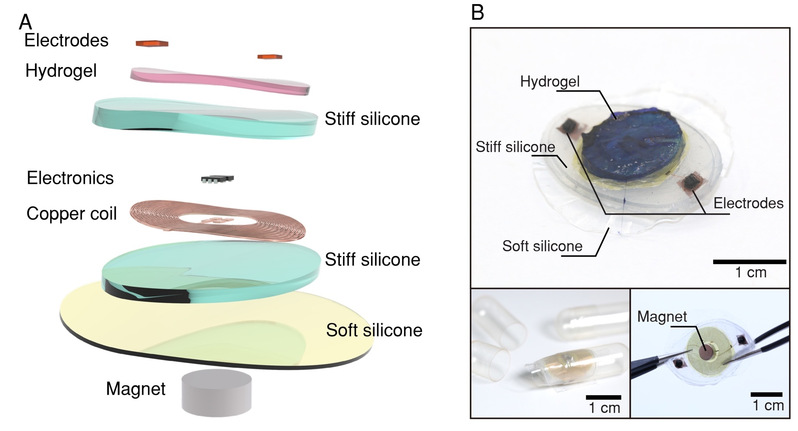Ingestible soft robot with remote manipulatability developed by team of CPS-ZJU
2024-08-19 | 药学院英文网
Gastric growth hormone-releasing peptide (Ghrelin), also known as "gastric hunger hormone", is a peptide secreted in the gastrointestinal tract, which plays a key role in regulating appetite and energy metabolism. When the human body is in a state of hunger, gastric hunger hormone is secreted in large quantities at the base of the stomach, which increases appetite and promotes food intake. Gastric hunger hormone affects the appetite regulation center in the hypothalamus by binding to specific receptors in the brain, which in turn regulates appetite and energy metabolism. The effects of gastric hunger hormone include increasing appetite, decreasing energy expenditure, and promoting fat storage. During the course of losing weight, gastric hunger hormone levels are typically higher, which may lead to increased appetite and energy intake. It can therfore help control appetite and promote weight loss by regulating gastric hunger hormone levels. Currently, drugs and therapies targeting gastric hunger hormone are being researched, aiming to achieve weight loss by inhibiting the secretion of gastric hunger hormone or reducing its activity.
Recently, a trio of researchers from Zhejiang University's Kewang Nan, City University of Hong Kong's Prof. Xinge Yu, and Massachusetts Institute of Technology's Prof. Giovanni Traverso, have joined forces to seek an alternative way to regulate gastric hunger hormone levels in the living body using a non-drug, non-invasive, and remotely manipulable method. Together, the team developed an ingestible, battery-free, tissue-adherent soft robot (IngRI) for non-invasive electrostimulation of the stomach and achieved regulation of gastric hunger hormone levels in adult pigs. Their work was published on Nature Communications titled "An ingestible, battery-free, tissue-adhering robotic interface for non-invasive and chronic electrostimulation of the gut", and College of Pharmaceutical Sciences, Zhejiang University is the first institution of the research.

The paper demonstrates an innovative ingestible soft robot, IngRI, which is a device designed for wireless chronic electrostimulation in the digestive tract. IngRI is initially encapsulated in a gelatin capsule, which will dissolve and release the folded IngRI when entering the gut. Once released, IngRI can navigate through the gut with the help of an external hand-held magnet to the desired location, specifically the stomach. Once at the target location, IngRI firmly adheres to the gastric mucosa using the adhesive properties of the bionic hydrogel, ensuring the stability of the device and the effective conformal-eletrode-to-tissue contact. Through near-field inductive coupling, IngRI is able to deliver programmable electrical pulses for stimulating the cells with electrical excitability in the gastrointestinal tract for therapeutic purposes. The design of this device overcomes some of the limitations of conventional ingestible electrostimulation devices, such as poor electrode-to-tissue contact and limited battery life, and opens up new possibilities for the treatment of gastrointestinal diseases.

The research demonstrates a conceptual soft body robot (IngRI) for enabling ingestible, wireless electrostimulation of the gastrointestinal tract. Both in vitro and in vivo tests indicated that the soft device architecture provided better electrode-to-tissue contact and longer retention time in the stomach than existing rigid electrostimulation devices. The short pulsed stimulation provided by IngRI further resulted in increased gastric hunger hormone levels in blood plasma, which can activate growth hormone secretagogue receptor (GHS-R) and stimulate food intake and fat deposition. These data support the potential for regulating appetite and treating other diseases through non-pharmacological neuromodulation.
Translator: Zihao Liu
Editor: Yichen Zhu


NEWS
-
10
2025.12
-
27
2025.11
-
25
2025.11
-
03
2025.11
-
30
2025.10
-
29
2025.10
